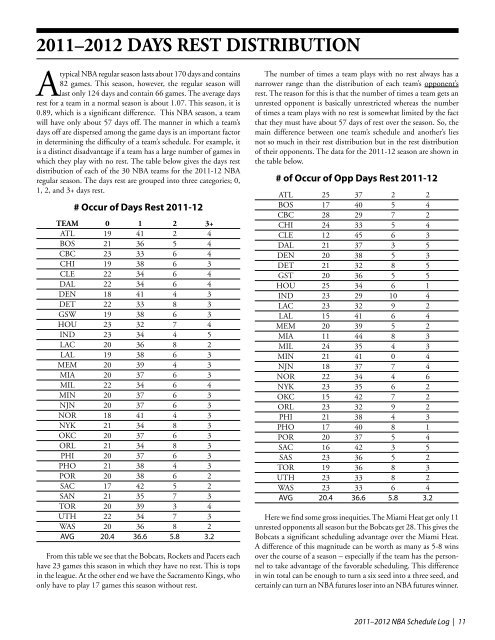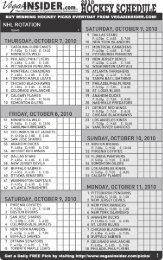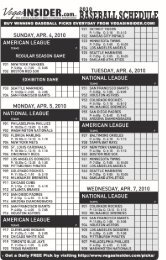You also want an ePaper? Increase the reach of your titles
YUMPU automatically turns print PDFs into web optimized ePapers that Google loves.
2011–2012 DAYS REST DISTRIBUTION<br />
A<br />
typical <strong>NBA</strong> regular season lasts about 170 days and contains<br />
82 games. This season, however, the regular season will<br />
last only 124 days and contain 66 games. The average days<br />
rest for a team in a normal season is about 1.07. This season, it is<br />
0.89, which is a significant difference. This <strong>NBA</strong> season, a team<br />
will have only about 57 days off. The manner in which a team’s<br />
days off are dispersed among the game days is an important factor<br />
in determining the difficulty of a team’s schedule. For example, it<br />
is a distinct disadvantage if a team has a large number of games in<br />
which they play with no rest. The table below gives the days rest<br />
distribution of each of the 30 <strong>NBA</strong> teams for the 2011-12 <strong>NBA</strong><br />
regular season. The days rest are grouped into three categories; 0,<br />
1, 2, and 3+ days rest.<br />
# Occur of Days Rest 2011-12<br />
TEAm 0 1 2 3+<br />
ATL 19 41 2 4<br />
BOS 21 36 5 4<br />
CBC 23 33 6 4<br />
CHI 19 38 6 3<br />
CLE 22 34 6 4<br />
DAL 22 34 6 4<br />
DEN 18 41 4 3<br />
DET 22 33 8 3<br />
GSW 19 38 6 3<br />
HOU 23 32 7 4<br />
IND 23 34 4 5<br />
LAC 20 36 8 2<br />
LAL 19 38 6 3<br />
MEM 20 39 4 3<br />
MIA 20 37 6 3<br />
MIL 22 34 6 4<br />
MIN 20 37 6 3<br />
NJN 20 37 6 3<br />
NOR 18 41 4 3<br />
NYK 21 34 8 3<br />
OKC 20 37 6 3<br />
ORL 21 34 8 3<br />
PHI 20 37 6 3<br />
PHO 21 38 4 3<br />
POR 20 38 6 2<br />
SAC 17 42 5 2<br />
SAN 21 35 7 3<br />
TOR 20 39 3 4<br />
UTH 22 34 7 3<br />
WAS 20 36 8 2<br />
AVG 20.4 36.6 5.8 3.2<br />
From this table we see that the Bobcats, Rockets and Pacers each<br />
have 23 games this season in which they have no rest. This is tops<br />
in the league. At the other end we have the Sacramento Kings, who<br />
only have to play 17 games this season without rest.<br />
The number of times a team plays with no rest always has a<br />
narrower range than the distribution of each team’s opponent’s<br />
rest. The reason for this is that the number of times a team gets an<br />
unrested opponent is basically unrestricted whereas the number<br />
of times a team plays with no rest is somewhat limited by the fact<br />
that they must have about 57 days of rest over the season. So, the<br />
main difference between one team’s schedule and another’s lies<br />
not so much in their rest distribution but in the rest distribution<br />
of their opponents. The data for the 2011-12 season are shown in<br />
the table below.<br />
# of Occur of Opp Days Rest 2011-12<br />
ATL 25 37 2 2<br />
BOS 17 40 5 4<br />
CBC 28 29 7 2<br />
CHI 24 33 5 4<br />
CLE 12 45 6 3<br />
DAL 21 37 3 5<br />
DEN 20 38 5 3<br />
DET 21 32 8 5<br />
GST 20 36 5 5<br />
HOU 25 34 6 1<br />
IND 23 29 10 4<br />
LAC 23 32 9 2<br />
LAL 15 41 6 4<br />
MEM 20 39 5 2<br />
MIA 11 44 8 3<br />
MIL 24 35 4 3<br />
MIN 21 41 0 4<br />
NJN 18 37 7 4<br />
NOR 22 34 4 6<br />
NYK 23 35 6 2<br />
OKC 15 42 7 2<br />
ORL 23 32 9 2<br />
PHI 21 38 4 3<br />
PHO 17 40 8 1<br />
POR 20 37 5 4<br />
SAC 16 42 3 5<br />
SAS 23 36 5 2<br />
TOR 19 36 8 3<br />
UTH 23 33 8 2<br />
WAS 23 33 6 4<br />
AVG 20.4 36.6 5.8 3.2<br />
Here we find some gross inequities. The Miami Heat get only 11<br />
unrested opponents all season but the Bobcats get 28. This gives the<br />
Bobcats a significant scheduling advantage over the Miami Heat.<br />
A difference of this magnitude can be worth as many as 5-8 wins<br />
over the course of a season – especially if the team has the personnel<br />
to take advantage of the favorable scheduling. This difference<br />
in win total can be enough to turn a six seed into a three seed, and<br />
certainly can turn an <strong>NBA</strong> futures loser into an <strong>NBA</strong> futures winner.<br />
2011–2012 <strong>NBA</strong> <strong>Schedule</strong> <strong>Log</strong> | 11










